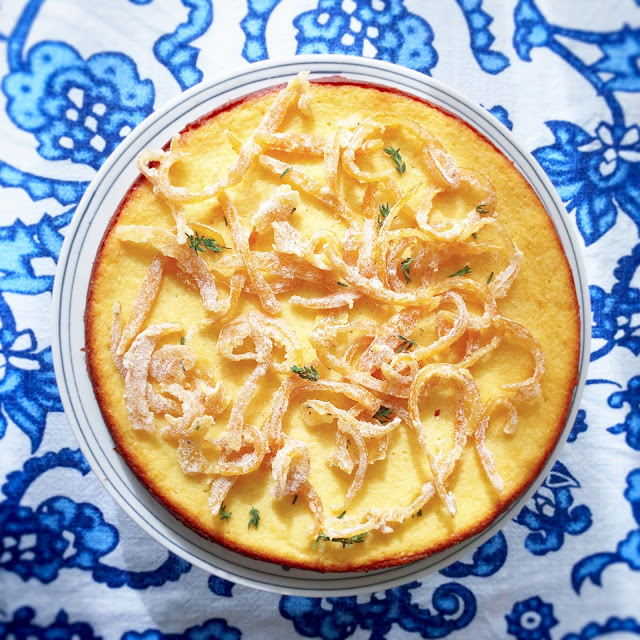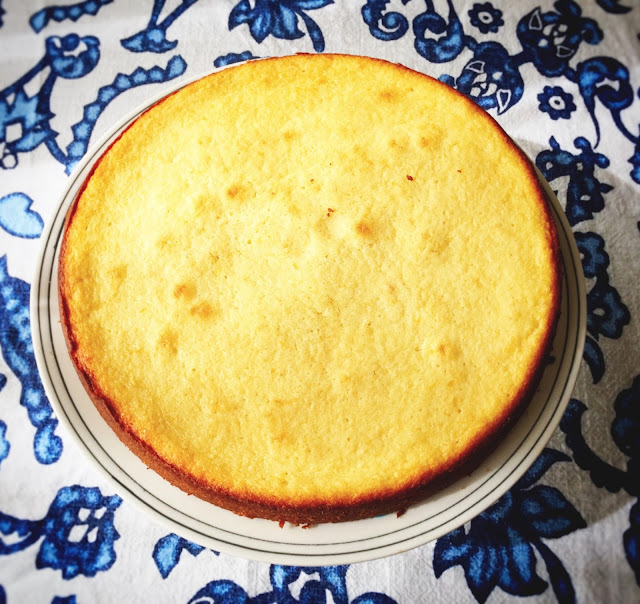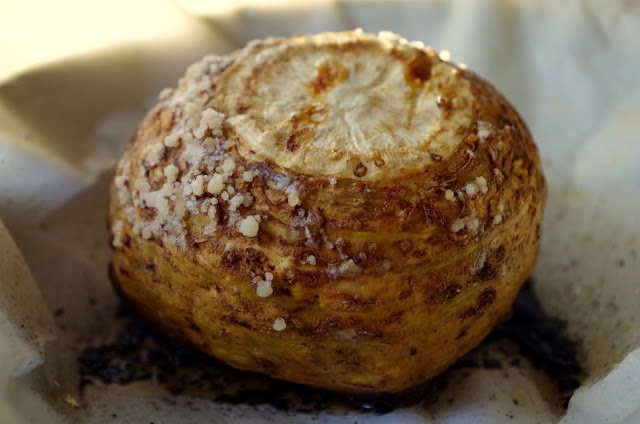Lemon Gâteau in The Particular Sadness of Lemon Cake // Cook Your Books
In this Cook Your Books series, I have chosen 15 books to read in 2017 based on somewhat arbitrarily chosen categories. My theory (bogus it might turn out to be) is that all 15 of these books will somehow connect to food. And I plan to write about that food in what appear to be rather long-winded posts (seriously, these are long!). This fourth installment is a book about food.
Okay, the choice of The Particular Sadness of Lemon Cake by Aimee Bender was an easy one. We all knew that this would incorporate food in some meaningful way. But come on, from time to time we need an easy path. So let's take it.
But I have a question to ask: why is so much food connected to innocence or to its loss? I have some answers, some of them perhaps flimsy, but answers nonetheless. We often associate food with our families, and when did we spend the most time with our families? Or more specifically with our parents? And if we are parents, with our children? When we were young, and (mostly) innocent or when we were watching the innocence of our children.
This book is in that vein.
Sure, I thought about choosing another food in this book (and there are plenty--fried chicken (13), sugar and jam on toast (36), chocolate chip cookies given to our protagonist by the boy she likes (61) homemade pretzels (117), Doritos (127), Tunisian lamb stew and eggplant-tomato tart (138), mass-produced and "utterly blank" enchiladas (167)), but in a book entitled The Particular Sadness of Lemon Cake, it seems a bit blasphemous to choose anything but the lemon cake. Given that it is so particular.
Rose's mother is not much of a baker, but she is a craftswoman who likes to work with her hands. She has gardened, stitched, installed oak doors, and as the book goes on, she becomes a furniture maker. This is a woman who wants to mold things, to produce things, to have her hand in it all. Her desire for creation seems to be a desire to leave her mark, to produce something less transient than her emotional state or her relational attachments to others.
While Rose's and her mother's lemon cake is one with chocolate frosting and rainbow sprinkles, I wanted something a little less geared for the nine-year-old set. But there is no cake--sprinkle-laden or not--described more lovingly than does Rose of her birthday confection:
The room filled with the smell of warming butter and sugar and lemon and eggs, and at five, the timer buzzed and I pulled out the cake and placed it on the stovetop. The house was quiet. The bowl of icing was right there on the counter, ready to go, and cakes are best when just out of the oven, and I really couldn't possibly wait, so I reached to the side of the cake pan, to the least obvious part, and pulled off a small warm spongy chunk of deep gold. Iced it all over with chocolate. Popped the whole thing in my mouth. (6)Here, Rose is in tandem with her mother--who has gone to lie down "for a bit"--taking the cake from the oven. And like her mother, Rose is full of desire and curiosity--in Rose's case, for the taste of her just-warm cake, for the celebration of her own birthday, for the connection to something luxurious and purely pleasurable. But it is a secret desire, one that she has to hide or at least not make look obvious. And I love the last two sentences--so simple and pure and confident that this would be as she had always expected it to be.
But such are not the realities as we enter into knowledge. It seems no mistake that Rose is nine. She is just entering those tween years, those years often hyperbolically marked by profound solipsism coupled with a growing awareness of a world beyond one's self. It's scary stuff:
[A]s I finished that first bite, as that first impression faded, I felt a subtle shift inside, an unexpected reaction...Because the goodness of the ingredients--the fine chocolate, the freshest lemons--seemed like a cover over something larger and darker, and the taste of what was underneath was beginning to push up from the bite. I could absolutely taste the chocolate, but in drifts and traces, in an unfurling, or an opening, it seemed that my mouth was also filling with the taste of smallness, the sensations of shrinking, of upset, tasting a distance I somehow knew was connected to my mother, tasting a crowded sense of her thinking, a spiral, like I could almost even taste the grit in her jaw that had created the headache that meant she had to take as many aspirins as were necessary... None of it was a bad taste, so much, but a kind of lack of wholeness to the flavors that make it taste hollow, like the lemon and chocolate where just surrounding a hollowness. My mother's able hands had made the cake, and her mind had known how to balance the ingredients, but she was not there, in it. (10)
And so she begins to understand that her mother is more than just her mother. That her mother is unhappy, unfulfilled, searching. "[W]ith each bite, I thought--mmm, so good, the best ever, yum--but in each bite: absence, hunger, spiraling, hollows" (10). Being Rose's (and her brother Joe's) mother (or being a wife to Paul) is not enough enough for Lane. That somehow making a cake is not the extent of what she wishes to create.
And so Bender sets off this novel in the first ten pages, letting us into Rose's burgeoning understanding of a world outside herself, into Lane's desire to mold and shape something bigger than herself in order to truly create her own individual self, into Rose's brother Joe's uncanny ability to merge so fully and completely with others (people, objects) than himself.
It is certainly no accident that Bender chose Brillat-Savarin's quotation in her epigraph, "Food is all those substances which, submitted to the action of the stomach, can be assimilated or changed into life by digestion, and can thus repair the losses which the human body suffers through the art of living." Particularly the losses of innocence, repaired through a sense of knowledge, connection, and the realization that our parents are more than just extensions of our selves. This is certainly a bildingsroman whose protagonist aches to stay young, to stay protected and innocent and ignorant. But we suffer through the art of living and hopefully repair what losses we can.
Which Rose ultimately does.
She learns to cook for herself: the first time a spectacular spaghetti with marinara sauce and big bowl of Parmesan cheese. (221). A simple dish, often one of the first many of us learn to make solely for ourselves in our first apartments or dorm rooms. And when Rose does, she tastes "sadness, rage, tanks, holes, hope, guilt, tantrums. Nostalgia, like rotting flowers. A factory, cold" (222). But it is hers, and Rose (now in her late teens) has a glimpse into herself the same way she did with her mother. She makes it again and again it tastes like a factory (241). "A machine-tinge I could not identify... Alongside a little-girl voice wanting to go back, to go back to a time with less information. Go back, said the little girl. Blank, said the factory" (242). But she cannot and will not go back.
Instead, she learns to cook, joining her sense of self to a simple French restaurant. She impresses the chef not through her cooking skill (which she is slowly acquiring) but through the simple knowledge that her first quiche has eggs from Michigan, milk from Fresno, bacon from an organic farm in Northern California, cream from Nevada, and parsley from San Diego (and she also knows that the parsley farmer is a jerk) (270). All from just a taste. Like it or not, Rose has learned two important things--that others are not extensions of herself and that, perhaps, she and the food she eats are truly products of and extensions of each other.
Thus, we repair each other's losses endured from the art of living.
------
Lemon Gâteau
"Flour bag, sugar box, two brown eggs nestled in the grooves between tiles. A yellow block of butter blurring at the edges. A shallow glass bowl of lemon peel... I dipped my finger into the wax baggie of brown-sugar crystals, murmered yes, please, yes" (The Particular Sadness of Lemon Cake 3).Adapted from Valerie Aikman-Smith and Victoria Pearson's Citrus: Sweet and Savory Sun-Kissed Recipes
This literally and figuratively sweet, little cake needs no topping (it has a lovely lemon juice glaze); however, I topped it with candied lemon peels (recipe here). Oh, but a thick whipped cream would be divine or even a drizzle of chocolate (if you want to conjure up the chocolate frosting from the book). The cake itself is tart and sweet and light and perfectly lemony.
Yield
Serves 6
Ingredients
⅔ cup unsalted butter at room temperature
¾ cup granulated sugar
zest and juice of 3 lemons
2 eggs
¾ cup all-purpose flour
½ tsp baking powder
⅔ cup confectioners' sugar
Instructions
1. Preheat the oven to 400° Fahrenheit. Butter a 9-inch round springform pan, then dust with flour and tap out the excess.
2. In the bowl of a stand mixer fitted with the paddle attachment, cream butter and sugar together on medium speed until light and fluffy. Slowly pour in one-third of lemon juice and then add eggs, one at a time, and continue to beat until well combined. Add flour and baking powder and continue to beat until a thick, smooth batter forms. Using a rubber spatula or wooden spoon, fold in two-thirds of lemon zest until evenly combined. Pour batter into prepared pan.
3. Bake cake until a thin wooden skewer inserted into the center comes out clean, about 25 minutes. Transfer to a wire rack and prick top of cake all over with skewer. Set aside.
4. In a small bowl, whisk together confectioners' sugar and remaining lemon zest and juice. Pour glaze over cake and allow to sit 10 minutes. Remove cake from pan, slide it onto a plate, and serve. Feel free to add some whipped cream (which would have been lovely) or candied citrus peels.












eating this would make me particularly happy. Though not so sure about reading the book
ReplyDeleteOfcorso, the book is quite good! More Cook Your Books posts soon!
Delete